Podcast Topic: Community & Economic Development
The Leading Voices in Food
Podcast Topic: Community & Economic Development
 E283: Taylor Hanson’s Food On The Move
E283: Taylor Hanson’s Food On The Move
September 24, 2025
Today we’re joined by Tulsa, Oklahoma, native Taylor Hanson, who at age nine with two of his brothers formed the band Hanson. Within five years, they released their initial album there were Grammy nominations and one of their songs hit number one in 27 countries. But more pertinent to our discussion today is Taylor’s commitment to social change, which includes work he’s done on extreme poverty in sub-Saharan Africa and the nonprofit grassroots organization addressing food insecurity he founded called Food On The Move. Food On The Move provides access, education and innovative solutions to transform food deserts and the legacy issues created by food insecurity. Since its founding, this organization has distributed millions of pounds of fresh produce to members of the Oklahoma community as a leader in the movement to reshape sustainable local food systems.
Related podcasts: Advocacy & Food | Community & Economic Development | COVID-19 Pandemic Impacts on Food | Economics of the food system | Food Insecurity | Philanthropy & Food Systems | Urban Agriculture |
 E282: Are healthy, environmentally sustainable diets economically achievable for everyone?
E282: Are healthy, environmentally sustainable diets economically achievable for everyone?
September 17, 2025
In today’s episode, we’re discussing the complex and urgent topic of global food demand. The United Nations Sustainable Development Goals, or SDGs, ask countries to make measurable progress in reducing poverty, achieving zero hunger, and supporting every individual in realizing good health. While also mitigating climate change, sustaining the environment and responsible consumption and production habits. Researchers have recommended sustainable diets – planetary health diets. For example, the Eat Lancet Planetary Health Diet. However, others have criticized some of these diets for not addressing the economic and social impacts of transitioning to such diets. Is it possible to balance changing diets, rising incomes, and economic growth with economic feasibility, environmental impact, and long-term sustainability? Well, that’s what our goals are today. Our guests today are Andrew Muhammad of the University of Tennessee Institute of Agriculture, and Emiliano Lopez Barrera from Texas A&M. They are my co-authors on a new paper in the Annual Review of Resource Economics entitled Global Food Demand: overcoming Challenges to Healthy and Sustainable Diets.
Related podcasts: Agriculture & Tech | Climate Change, Environment & Food | Community & Economic Development | Economics of the food system | International Food & Ag Policy |
 E268: Why Corporate Control of Agriculture is Cause for Concern
E268: Why Corporate Control of Agriculture is Cause for Concern
March 26, 2025
How big is too big? When it comes to corporate concentration many observers raise concerns about the tech industry. However, in the new book, Titans of Industrial Agriculture: how a few giant corporations came to dominate the farm sector and why it matters, political economist Jennifer Clapp draws attention to the overwhelming shadow a small handful of transnational corporations cast over the global agricultural sector. Professor Clapp argues that these corporations hold concentrated power over the agricultural sector that keep industrial agricultural practices entrenched in patterns of production, despite the concerns of the social, ecological and health impacts to society. She explains how we got to this point and what it might take to make changes. Jennifer’s work at the intersection of the global economy, food security, and food systems, and the natural environment, looks specifically at issues of global governance. She is currently a member of the International Panel of Experts on Sustainable Food Systems, and a member of the Scientific Advisory Committee of the UN Food Systems Coordination Hub.
Related podcasts: Agriculture & Tech | Climate Change, Environment & Food | Community & Economic Development | Economics of the food system | Food Industry Behavior & Marketing | History & Food | International Food & Ag Policy |
 E267: Nzatu uses bees and ancient grains to uplift African farmers
E267: Nzatu uses bees and ancient grains to uplift African farmers
March 24, 2025
The climate crisis is devastating the ability of African farmers to support themselves and their communities. Farmers struggle with a lack of running water, electricity, communications, and public transportation. Entire communities are often cut off from the larger world, exacerbating and extending the poverty crisis that grips large parts of the continent. To overcome these issues, our guest, Gwen Jones, co-founded Nzatu Food Group, a regenerative agriculture business designed to protect biodiversity and mitigate climate change. Nzatu Food Group has done some remarkable pioneering work. Gwen is connected to 15,000 Sub-Saharan farmers across 15 countries through beekeeping, sustainable agricultural and conservation training, and by building an increasingly international market for farm products.
Related podcasts: Agriculture & Tech | Climate Change, Environment & Food | Community & Economic Development | Economics of the food system | History & Food | International Food & Ag Policy | Voice of Farming |
 E266: What’s next for school meal quality?
E266: What’s next for school meal quality?
March 13, 2025
The food and nutrition landscape in our schools is really important. School meals affect the health, wellbeing, energy, vitality, and ability to learn for millions and millions of children. And for those whose family struggled to buy food, the importance of school meals cannot be overstated. This makes decisions about what foods are served in schools and where they come from. Highly consequential and raises issues about national and state nutrition policies, the influence of big food companies in shaping this picture and lots more. It’s a good time to unravel all this, which we can do today. Thanks to two experts with us. Dr. Marlene Schwartz is Professor of Human Development and Family Sciences and Director of the Rudd Center for Food Policy health at the University of Connecticut. Mara Fleishman is CEO of the Chef Ann Foundation, where she has been a leader advancing school food change, advocating for scratch cook meals that promote children’s health and for more sustainable food systems.
Related podcasts: Advocacy & Food | Child Development & Nutrition | Childhood Obesity | Community & Economic Development | School Meals | Ultra-processed Food & Additives |
 E264: Citizen engagement in post-Brexit UK food and farming policy
E264: Citizen engagement in post-Brexit UK food and farming policy
February 17, 2025
Today we’re exploring civil society’s efforts to shape the food system and land use in the United Kingdom. Our guest today is Sue Pritchard, Chief Executive of the Food, Farming, and Countryside Commission (FFCC). The deeply grassroots work of the commission brings people together to find practical solutions to climate, nature, and health challenges. The goal is to shape fairer and more sustainable food systems and a just transition for rural communities and the countryside.
Related podcasts: Advocacy & Food | Agriculture & Tech | Climate Change, Environment & Food | Community & Economic Development | Food System Narratives |
 E263: Explore the Daily Table non profit grocery store model
E263: Explore the Daily Table non profit grocery store model
February 5, 2025
Today, we’re going to explore Daily Table, an innovative non profit grocery chain dedicated to providing fresh, convenient, and nutritious food affordable to everyone, even those on the Supplemental Nutrition Assistance Program, or SNAP. In today’s economic climate, where rising food prices are impacting households across the country, the concept of a non profit grocery store seems to fill a real need. Our guest today is Daily Table CEO, Sasha Purpura, a software engineer who spent 15 years in the tech industry and product management and development roles.
Related podcasts: Advocacy & Food | Community & Economic Development | Economics of the food system | Equity, Race & Food Justice | Food Banks, Food Pantries & Soup Kitchens | Food Insecurity | Philanthropy & Food Systems |
 E253: Learnings from No Kid Hungry in New York
E253: Learnings from No Kid Hungry in New York
October 29, 2024
When we talk about problems with food insecurity and the food system, we tend to reference challenges at the national or international level. And of course, work at that level really needs to be done. But increasingly, there is a unique focus on regional food system strategies and right sizing solutions to best fit those unique characteristics of a particular locale. In today’s podcast, we will talk with Rachel Sabella, director of No Kid Hungry New York. She leads the planning, implementation, and evaluation of the No Kid Hungry campaigns across the state of New York.
Related podcasts: Child Development & Nutrition | Community & Economic Development | Equity, Race & Food Justice | Food Policy |
 E250: Roots of Change – Successful, incentive-based food and farm policy advocacy
E250: Roots of Change – Successful, incentive-based food and farm policy advocacy
October 8, 2024
Join Kelly Brownell in a conversation with Michael Dimock, Executive Director of Roots of Change, about transforming food systems through innovative policies. Discover how Roots of Change collaborates with various stakeholders to create nutrition incentive programs and support sustainable agriculture, focusing on community-first approaches. Learn about pioneering projects, insights into policy influence, and the future of agricultural practices. This episode provides an optimistic view of the evolving food system landscape and the potential for significant positive change.
Related podcasts: Advocacy & Food | Climate Change, Environment & Food | Community & Economic Development | Equity, Race & Food Justice | Food Policy | Regenerative Agriculture |
 E248: Climate-smart strategies for small-scale fishing communities
E248: Climate-smart strategies for small-scale fishing communities
September 26, 2024
Join host Norbert Wilson and co-host Kerilyn Schewel in the latest episode of the Leading Voices in Food podcast as they dive deep into the world of small-scale fisheries with two distinguished guests: Nicole Franz from the Food and Agriculture Organization of the United Nations (FAO) and John Virdin from Duke University’s Nicholas Institute for Energy, Environment, and Sustainability. Discover the significant role small-scale fisheries play in food security, economic development, and community livelihoods. Learn about the unique challenges these fisheries face, and how community-led climate adaptation alongside top-down national policies can help build resilience. This episode also highlights collaborative efforts between academia and organizations like FAO, painting a comprehensive picture of the state and future of small-scale fisheries.
Related podcasts: Agriculture & Tech | Climate Change, Environment & Food | Community & Economic Development | Fisheries & Food Policy | Food Insecurity | Food Policy | International Food & Ag Policy |

 E268: Why Corporate Control of Agriculture is Cause for Concern
E268: Why Corporate Control of Agriculture is Cause for Concern E267: Nzatu uses bees and ancient grains to uplift African farmers
E267: Nzatu uses bees and ancient grains to uplift African farmers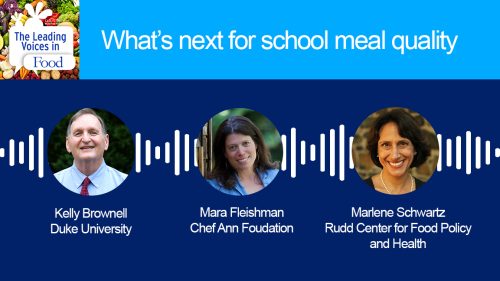 E266: What’s next for school meal quality?
E266: What’s next for school meal quality?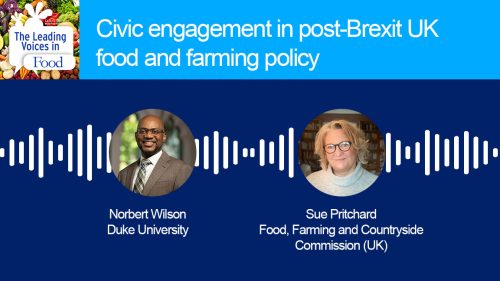 E264: Citizen engagement in post-Brexit UK food and farming policy
E264: Citizen engagement in post-Brexit UK food and farming policy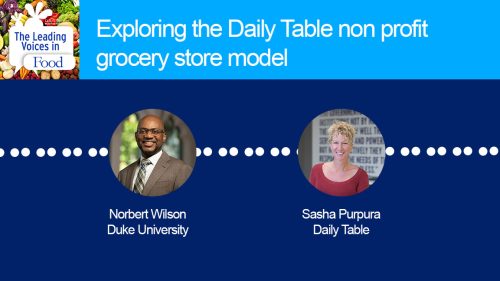 E263: Explore the Daily Table non profit grocery store model
E263: Explore the Daily Table non profit grocery store model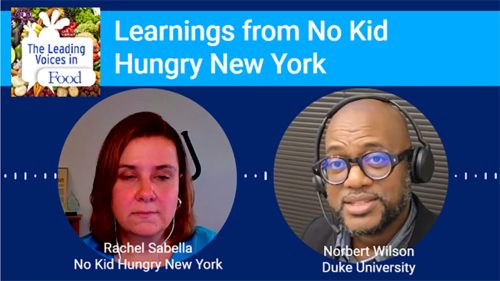 E253: Learnings from No Kid Hungry in New York
E253: Learnings from No Kid Hungry in New York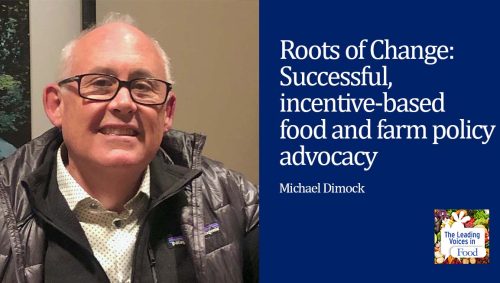 E250: Roots of Change – Successful, incentive-based food and farm policy advocacy
E250: Roots of Change – Successful, incentive-based food and farm policy advocacy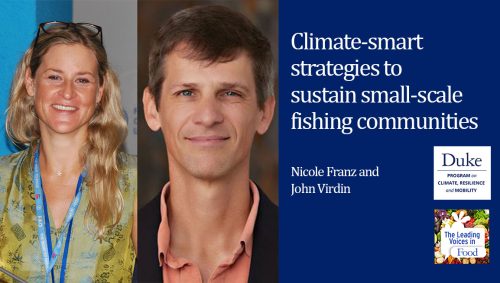 E248: Climate-smart strategies for small-scale fishing communities
E248: Climate-smart strategies for small-scale fishing communities